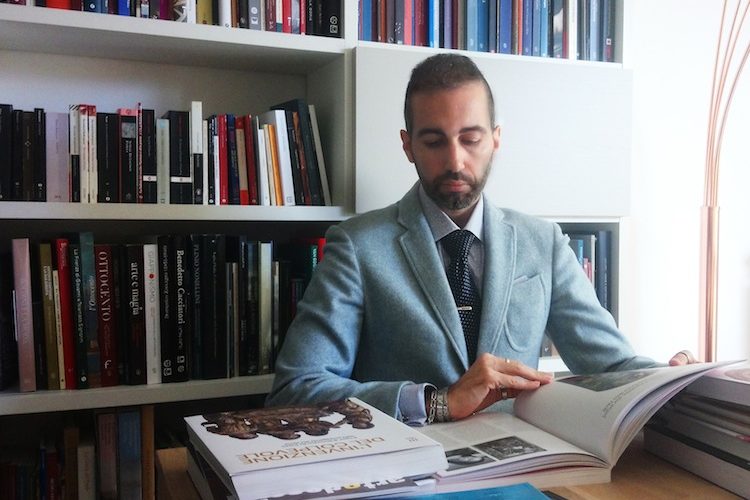Federico Giannini from Carrara
Your new daily ritual… How your way of working has changed?
If I think of work in its concrete manifestation, in reality not much has changed from before: being a journalist and trying to limit worldliness to what is strictly necessary, I normally spend most of my day reading and writing, and this formula has not undergone major changes during the weeks of confinement. Solo, following the advice given by psychologists, I tried to spell it out much more precisely, regular and rigorous days, with some minimal variation to avoid the too obsessive repetition of the routine: a practice that I find difficult to follow in conditions of full normality. If I think instead of the fundamentals of my work, the dimension of live knowledge that is substantiated in social relations was lacking, in visiting exhibitions and museums, in participating in events. I filled it by increasing another of the fundamentals of a journalist: reading.
With which objects and spaces of your daily life are you interacting the most?
An object: the books. Paper and digital format, recent and ancient, for escapism and for work, classics and little-known titles, good and bad, recently purchased and at home for years waiting to be read: they have been a constant and living presence. I believe that confinement has not made us lack opportunities for knowledge, and I also find the commitment that many, in our industry, they lavished on getting us new content every day, new ideas, new reflections. A space: the neighborhood. In my region, beyond the movements allowed for the known reasons of necessity, it was allowed to go out for physical activity only in the now infamous “proximity of the house”. I have therefore “interacted” a lot with my neighborhood, which is actually not part of my normal daily life, since I frequent it very little. Basically, the daily life that surrounds me has become my new daily life.
What you're missing? Your personal experience of”absence” and of “lack”.
Lack is a perception, absence is the modality and the space in which the lack acts. These are values to be positively connoted, a lot of the art of the twentieth century has taught us this, from Agnetti and Christo onwards. Lack is, in other words, point out the presence of what is absent. It is clear that the very narrow circumscription of our freedoms for health reasons has led all of us to make us feel the lack of those freedoms that we took for granted.. But I think that this lack has served to affirm the value of those freedoms. I therefore hope that we will be more aware of their importance.
What should be the role of publishing in a historical moment like the present one? A magazine or a specialized information platform, what challenges it can contribute to face?
I think this historic moment has underlined the need for a new public opinion that is once again founded on intermediation. Public opinion, as we knew it, it has been undermined by the changes that the media have undergone in recent years: the events of the last few weeks have however highlighted, in my opinion quite clearly, the absence of a model based on the absolute equivalence of opinions, and then divided, particle, unable to exert even minimal pressure (and, accordingly, nor can it be summarized any more under the concept of “public opinion”). To the press, publishing is presenting itself with a perhaps unrepeatable opportunity to assert its authority. We are therefore called to the test of responsibility: and this applies to all information, generalist and specialist. We need to win back the trust of the public. And in this we, sector publications, let's start with an advantage: we must be aware of this and do what we have always done, or work knowing who our audience is, in the meantime, our most precious asset, and secondly that correct information, chiara, free and rigorous is the most effective way to get the public on our side. It seems obvious to say so, but experience has not always comforted us. And then, specialist information must be imagined as the piece of that mosaic that is our interconnected world and where we can no longer take the luxury of thinking as if we lived inside watertight compartments.
When all this is over: one thing to do and one never to do again.
Thinking about what to keep doing and what never to do again in general terms means thinking about utopias, but on the other hand the human race progresses in search of utopias, and utopias, small or large, near or far, they are places that fill our lives with meaning (or at least for me it is). What we no longer have to do is persevere in our disinterest in public affairs. I believe that the situation we have experienced has sufficiently shown us how every single choice of ours has a weight for our life and for that of others.. I don't know if the fact that everyone was so involved and interested in learning more, to know, to inquire, it really derives from a collective awareness or is it more simply because what we have lived has upset our daily life. But I think recent events have highlighted the fact that there is potential. Back, what we will have to do instead is acquire a deeper awareness of ourselves, acting in our daily lives in all ways to be free citizens.
Federico Giannini, born in 1986, graduated in Humanities Computer Science at the University of Pisa in 2010, lives in Carrara. Journalist, he is the founder and managing director of the newspaper Windows on Art, a magazine with a double soul (print and online), entirely devoted to art, ancient and contemporary, and the topicality of cultural heritage. He has been collaborating for years with Art and Dossier and with Left.

